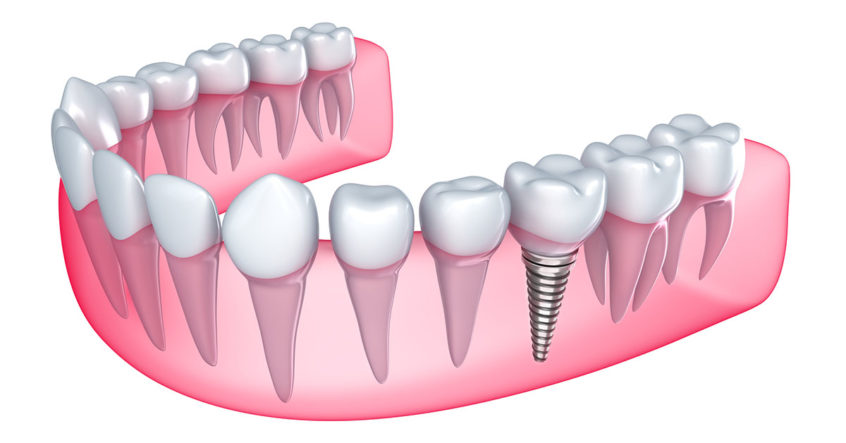Whether due to accident or decay, it is not always possible to save a tooth or teeth. Sometimes the best course of action is to extract the afflicted tooth. However, because missing teeth can affect one’s ability to eat and speak properly, patients with missing teeth may consider bridges, dentures, or implants to replace the missing teeth. If your dentist has recommended dental implant surgery as part of your treatment plan, you may have questions about the surgery and what to expect during recovery.
What is dental implant surgery?
Dental implant surgery is a process in which posts are surgically implanted into the bones in the jaw. The posts, made of biocompatible titanium, are made to replace the roots of the teeth. After the posts are implanted, the bone heals around the post, creating a solid, strong foundation for the crown. Artificial teeth are then attached to the posts, effectively replacing any missing or damaged natural teeth. Implants are often used as an alternative to bridges or dentures.
An implant consists of three parts:
- The post (which is a cylinder that is implanted into the bone, and the bone heals around the post)
- An abutment
- The crown (which is the part of the implant that resembles a natural tooth)
Another type of implant surgery is dental implant removal surgery. Sometimes an implant might need to be removed due to bone loss, infection, or peri-implantitis.
What to expect after implant surgery?
Depending on your specific treatment plan, you may have one procedure, or you may have several procedures performed over the span of a few months. For instance, your dentist may recommend a bone graft prior the implant insertion. In either case, taking proper steps to facilitate healing and a smooth recovery can help make your post-surgery experience better.
Common post-surgery complaints include:
- Some discomfort and tenderness at the implant site
- Minor bleeding (Note: excessive bleeding should be treated as an emergency)
- Bruising of gums
- Swollen gums
- Swollen face
If swelling and pain increase, rather than subsides, consult your dentist immediately to rule out an infection. You may be prescribed antibiotics or pain medication.
Dental implant surgery recovery
During your initial recovery, you’ll have to follow a few protocols to help facilitate healing.
- Avoid the use of straws and smoking to reduce the risk of dry socket
- Avoid hot foods during the first 24 hours
- Solid food should also be avoided during recovery
- Opt for soft, lukewarm or cool foods
- Use an ice pack to reduce swelling: A bag of peas will work, but you can also use ice packs tailored for dental work. A convenient strap holds the ice pack in place, offering you relief right where you need it the most.
- Use a salt water rinse: Ideally, wait about two days to use a salt water rinse; rinse gently.
Most importantly, follow any specific direction given to you by your dentist. Take any prescribed medications as directed.
Conclusion
Have you or a family member been considering dental implant surgery? If you think implants may be right for you, contact Greater Baltimore Prosthodontics for a consultation.

